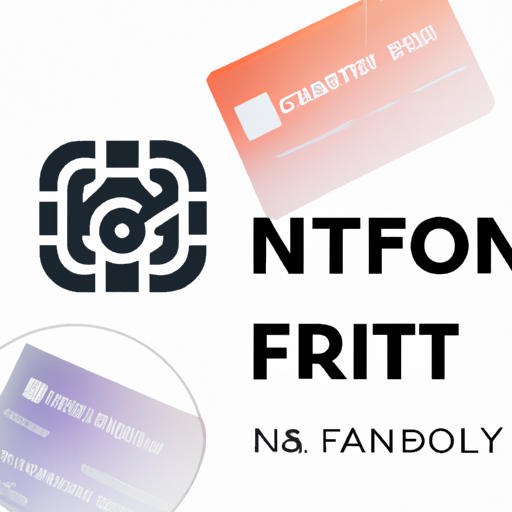I. Introduction to NFTs and Digital Identity
II. Understanding the Link between NFTs and Digital Identity
III. The Benefits of NFTs in Establishing Digital Identity
IV. Challenges and Considerations in Implementing NFTs for Digital Identity

Introduction to NFTs and Digital Identity
Hey there, fellow digital enthusiasts! Today, we’re diving into the captivating world of NFTs and digital identity. Buckle up, because we’re about to embark on an exhilarating journey through the interconnected realms of blockchain and personal online presence.
So, what exactly are NFTs? Well, my friend, NFT stands for non-fungible token. Unlike cryptocurrencies such as Bitcoin or Ethereum, which are interchangeable and hold the same value, NFTs are unique and indivisible. They are like the Mona Lisa of the digital world, representing one-of-a-kind digital assets, ranging from artwork and music to videos and virtual real estate.
Now, let’s talk about digital identity. In this era of social media and online interactions, our digital identity has become an integral part of who we are. It’s the way we present ourselves, engage with others, and leave our mark in the vast expanse of the internet. It’s our virtual fingerprint, if you will.
But what’s the connection between NFTs and digital identity, you ask? Well, my curious friend, NFTs have the power to revolutionize the way we establish and authenticate our digital identities. By attaching unique NFTs to our online presence, we can assert ownership and prove the authenticity of our digital assets, creations, and contributions.
Imagine having a digital certificate of authenticity for your artwork, a verifiable badge of honor for your music, or a secure record of your virtual achievements in gaming. NFTs enable us to establish a tangible link between our digital endeavors and our personal identity, granting us a sense of ownership and recognition in the vast digital landscape.
But wait, there’s more! The benefits of NFTs in establishing digital identity go beyond mere ownership and authenticity. These digital tokens provide artists, creators, and innovators with new monetization opportunities. By minting and selling their unique digital assets as NFTs, they can directly connect with their audience, bypassing traditional intermediaries and earning revenue in the process.
However, like any groundbreaking technology, implementing NFTs for digital identity comes with its fair share of challenges and considerations. We must address concerns surrounding copyright infringement, intellectual property rights, and the environmental impact of blockchain technology. It’s crucial to strike a balance between innovation and responsibility to ensure a sustainable and ethical digital ecosystem.
So, my friends, as we venture deeper into the world of NFTs and digital identity, let’s remember to embrace the potential these technologies hold while remaining vigilant and conscious of the impact they have on our digital lives.
If you want to delve further into the exciting realm of NFTs and blockchain, check out this resource from Coindesk. It’s a treasure trove of knowledge for all things crypto!
Understanding the Link between NFTs and Digital Identity
So, you’ve heard about NFTs and digital identity, but what exactly is the connection between the two? Let’s dive in and unravel this intriguing relationship.
NFTs, or non-fungible tokens, have taken the digital world by storm. These unique digital assets, typically based on blockchain technology, have gained popularity in various industries, including art, music, and even virtual real estate. But how do they relate to digital identity?
Well, at their core, NFTs provide a way to verify and establish ownership of digital assets. They serve as a digital certificate of authenticity, allowing creators and collectors to prove the uniqueness and ownership of their digital creations. This is where the connection to digital identity comes into play.
Think of digital identity as your online persona, the digital representation of who you are in the virtual world. It encompasses your online presence, your activities, and the digital assets you own. NFTs can be used as a powerful tool to establish and enhance this digital identity.
By attaching NFTs to digital assets, creators can prove their ownership and authorship, protecting their intellectual property rights. This is particularly crucial in the art world, where plagiarism and unauthorized reproductions are rampant. With NFTs, artists can confidently showcase their work, knowing that it is uniquely tied to their digital identity.
But it’s not just about artists and creators. NFTs can also empower individuals to take control of their digital identity. Imagine a world where you have full ownership and control over your personal data, where you can securely store and manage your digital assets. NFTs can make this a reality.
For example, imagine owning an NFT that represents your academic qualifications or professional certifications. With this digital asset, you can easily prove your credentials to potential employers or educational institutions, without the need for cumbersome paperwork or relying on third-party verification services.
NFTs can also play a role in combating online fraud and identity theft. By linking digital assets to a unique token, it becomes much harder for malicious actors to impersonate or steal someone’s digital identity. This added layer of security can provide individuals with peace of mind and help build trust in the digital realm.
However, it’s important to acknowledge that implementing NFTs for digital identity is not without its challenges. There are considerations around privacy, data protection, and interoperability that need to be addressed. The technology is still relatively new, and there is a learning curve for both creators and users.
As with any emerging technology, it’s crucial to approach NFTs and digital identity with caution and a critical eye. Educate yourself, seek advice from experts, and stay informed about the latest developments in the field. With the right knowledge and understanding, NFTs can be a powerful tool in establishing and protecting your digital identity.
So, next time you come across an NFT, remember that it’s not just a digital asset; it’s a piece of someone’s digital identity. And with the right safeguards and responsible use, NFTs can revolutionize the way we perceive and manage our online personas.
Stay tuned for the next section, where we’ll explore the benefits of NFTs in establishing digital identity. Trust me, you don’t want to miss it!
The Benefits of NFTs in Establishing Digital Identity
So, you’ve heard all the buzz about NFTs and digital identity, but what exactly are the benefits of using NFTs to establish your digital presence? Buckle up, because I’m about to break it down for you.
- Ownership and Authenticity: One of the key advantages of NFTs in establishing digital identity is the ability to prove ownership and authenticity. With traditional digital assets, it’s easy for someone to copy, alter, or steal your work without leaving a trace. But with NFTs, each piece is unique and can be traced back to its original creator. So, whether you’re an artist, a musician, or a content creator, NFTs provide a secure and verifiable way to showcase your work and establish your digital identity.
- Monetization Opportunities: NFTs have opened up a whole new world of monetization possibilities for creators. By tokenizing your digital assets, you can sell them directly to collectors, bypassing traditional intermediaries. This not only allows you to retain more control over your work but also enables you to earn a fairer share of the profits. So, if you’ve been struggling to make a living from your creative endeavors, NFTs could be a game-changer for you.
- Community Engagement: NFTs have revolutionized the way creators interact with their audience. By minting and selling NFTs, you can build a community of dedicated supporters who are not just fans but also investors in your success. This direct connection with your audience allows for deeper engagement, feedback, and collaboration. So, if you’re looking to build a loyal following and foster meaningful relationships with your fans, NFTs provide the perfect platform.
- Preservation of Digital History: In the digital age, preserving our cultural heritage and history has become increasingly challenging. But NFTs offer a solution. By tokenizing important digital artifacts, such as historical documents, artworks, or even tweets, we can ensure their preservation for future generations. NFTs provide a way to immortalize these digital treasures and make them accessible to a wider audience, all while maintaining their integrity and authenticity.
- Enhanced Copyright Protection: Copyright infringement is a major concern for creators, especially in the digital realm. NFTs can help address this issue by providing a clear record of ownership and provenance. With each NFT transaction recorded on the blockchain, it becomes easier to track and enforce copyright claims. This not only protects the rights of creators but also encourages a culture of respect for intellectual property.
So, there you have it – the benefits of using NFTs to establish your digital identity. From proving ownership and authenticity to unlocking new monetization opportunities and fostering community engagement, NFTs offer a range of advantages for creators in the digital age. Just remember, as with any emerging technology, there are also challenges and considerations to navigate. But if you approach it with a mix of creativity, caution, and a sprinkle of sass, you’ll be well on your way to making your mark in the world of NFTs and digital identity.
IV. Challenges and Considerations in Implementing NFTs for Digital Identity
While NFTs offer exciting possibilities for establishing digital identity, there are several challenges and considerations that need to be addressed. Let’s dive into some of the key issues:
1. Scalability
As the popularity of NFTs continues to grow, scalability becomes a pressing concern. The current blockchain infrastructure, particularly on Ethereum, has struggled with high transaction fees and network congestion. This can hinder the seamless implementation of NFTs for digital identity on a large scale. It is crucial for developers and blockchain networks to find solutions that can handle increased demand without compromising efficiency.
2. Privacy and Security
Privacy and security are paramount when it comes to digital identity. While NFTs can provide a unique identifier for individuals, there is a need to ensure that personal information remains protected. Blockchain technology itself offers a high level of security, but additional measures must be taken to safeguard sensitive data associated with NFT-based digital identities. It is essential to strike a balance between transparency and privacy.
3. Interoperability
Interoperability is another significant challenge in implementing NFTs for digital identity. Different blockchain networks and platforms have their own standards and protocols, making it difficult for NFTs to seamlessly interact with each other. To establish a comprehensive digital identity system, there needs to be interoperability between various NFT ecosystems. Collaboration and standardization efforts are crucial to overcome this hurdle.
4. User Experience
For NFTs to gain widespread adoption in the realm of digital identity, the user experience must be intuitive and user-friendly. Currently, the process of minting, transferring, and managing NFTs can be complex and daunting for non-technical users. Simplifying the user interface and streamlining the user journey will be essential to ensure that individuals can easily interact with their digital identities.
5. Regulatory Compliance
The regulatory landscape surrounding NFTs and digital identity is still evolving. Governments and regulatory bodies are grappling with how to address the legal and compliance aspects of this emerging technology. Implementing NFTs for digital identity will require navigating these regulatory frameworks, ensuring compliance with data protection, anti-money laundering, and other relevant regulations. Collaboration between the industry and regulators is vital to establish a secure and compliant environment.
Addressing these challenges and considerations is crucial to realizing the full potential of NFTs in establishing digital identity. While there are hurdles to overcome, the opportunities for self-sovereign identity and enhanced security are immense.
Remember, as you navigate the world of NFTs and digital identity, it’s essential to stay informed and seek expert advice. If you’re interested in exploring the world of NFTs further, you can check out Sublimetraders.com. They are one of the best crypto and forex signal providers, offering valuable insights and guidance for those venturing into the crypto space.

